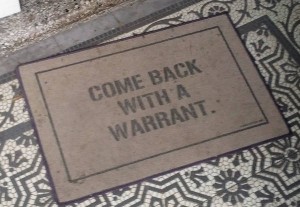Can Police Search Your Home Without A Warrant?

People have a greater expectation of privacy in their homes than in their cars. Thus, the Fourth Amendment generally requires police to get a warrant before entering or searching a house. This protection applies to anyone living in a home, whether they are homeowners, renters, or even overnight guests. If the police search without a warrant, any evidence they find could be suppressed if no exception to the warrant requirement applies.
If the police have obtained a warrant, that means a judge has already determined that they have probable cause to search the house. Of course, that doesn't stop the police from making mistakes. I have seen them search the wrong house or apartment, and I have also seen them exceed the scope of the search authorized by the warrant. The warrant itself should put limits on the search and, of course, the legitimacy of the warrant may be challenged later in court. But can the police enter and search without a warrant? They can under certain circumstances. Here are some of the most common exceptions to the warrant requirement:
Circumstances That Could Allow Police To Search Without A Warrant
But can the police enter and search without a warrant? They can under certain circumstances. Here are some of the most common exceptions to the warrant requirement:
- Consent: Anyone with authority (anyone with joint access to, or control over the property) can waive the warrant requirement by agreeing to allow the police to enter and search the home. Even if the person does not have actual authority, a search can be justified by consent if the police reasonably believe the person has authority. The prosecutor has the burden of proving that the consent was freely and voluntarily given. Consent can also be limited to certain areas of the home.
- Plain View: If a police officer sees evidence in plain view when he is lawfully in a position to see it, he may be able to seize it. For example, if the officer is legally inside the home for an unrelated reason and he sees some sort of contraband, he can seize it. However, if the officer is outside of the home and sees the evidence in plain view, through a window perhaps, he is still required to get a warrant before entering the home and seizing the contraband. An officer is legally permitted to see things from any public vantage point, but cannot enter the home or its "curtilage". Curtilage includes fenced yards and can include unfenced yards, although the police are usually allowed to walk up to your door and knock on it.
- Exigent Circumstances: A police officer can enter and search a home if he has probable cause to search the home and reasonably believes that the delay caused by the process of obtaining a search warrant would result in the loss of evidence or jeopardize safety. This exception is meant to apply to emergency situations, but it can also apply in more seemingly innocuous situations. Here are some of the common exigent circumstances: (1) Drugs/Destruction of Evidence: If an officer knocks on the door of a home that he believes contains drugs and no one answers, but he hears the toilet being flushed and believes that drugs are potentially being flushed down the toilet, he may be justifies in entering the home. Similarly, if an officer smells an odor of burning marijuana coming from a home, his entry may be justified because evidence is being destroyed. (2) Domestic Violence: When an officer responds to a domestic violence call and believes that someone inside the house is being assaulted, he can generally enter to protect that person. (3) Evidence of Burglary: If police see signs that a house has been burglarized, like a broken window or door, they can generally enter the house. (4) Hot Pursuit: When police are pursuing a suspect who they have probable cause to arrest, they may follow the suspect into a home.
- Search Incident to Arrest: If you are arrested in your home, the police may conduct a "protective sweep" if they have a reasonable belief that the home may harbor another person that poses a danger. This allows them to search anywhere that such a person could be located within the home.
If the police are not justified in entering and searching your home without a warrant, any evidence they discover can be suppressed. This means that the prosecution may not be permitted to use the evidence at trial. Any legal justification that the police do assert will be highly fact-dependant, so it's important to consult an experienced criminal defense attorney who can conduct a detailed evaluation of the search to determine whether it can be challenged.
* This blog is published by Tucson criminal defense attorney Nathan D. Leonardo. Nothing on this website is intended to create an attorney-client relationship. The information provided herein does not constitute legal advice, but is for general information purposes only. If you have a legal question, you can contact us online or call (520) 314-4125.
